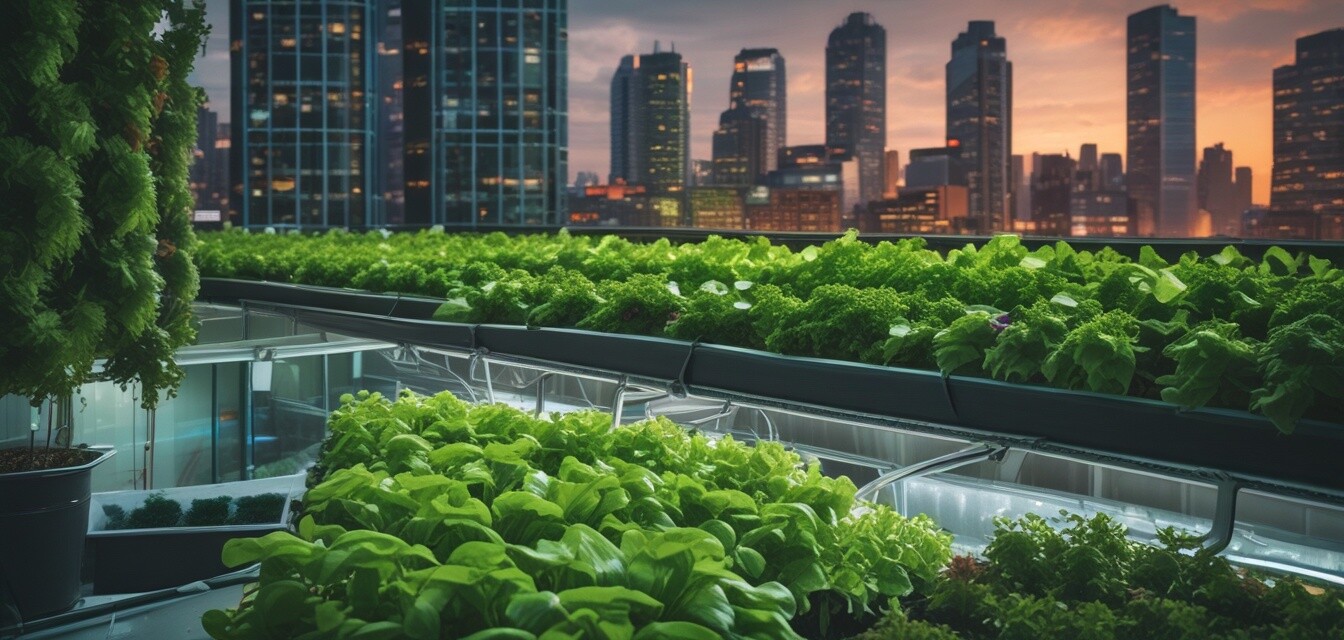
How Hydroponics is Shaping the Future of Urban Farming
Key Takeaways
- Hydroponics is revolutionizing the way cities grow food.
- It enables efficient use of space, making it ideal for urban settings.
- Hydroponics contributes to enhancing biodiversity.
- It creates more sustainable food systems by reducing transportation emissions.
Urban farming is becoming increasingly crucial as cities grow and the demand for fresh produce rises. Hydroponics, a method of growing plants without soil, is taking center stage in urban agriculture. This innovative technique allows city dwellers to cultivate their own food, effectively addressing food security issues. In this article, we'll explore how hydroponics is transforming urban farming, fostering sustainable practices, and enhancing biodiversity in our cities.
The rise of hydroponic systems in urban areas
As people flock to urban environments, traditional farming methods face significant challenges. Hydroponics is emerging as a solution to these challenges, as it can be implemented in small spaces and offers numerous benefits over conventional farming:
| Benefit | Description |
|---|---|
| Space Efficiency | Hydroponics allows for vertical farming, maximizing space in urban settings. |
| Water Conservation | Hydroponic systems use up to 90% less water than traditional farming methods. |
| No Soil Required | Eliminates soil-related issues such as pests and diseases, ensuring healthier plants. |
| Year-Round Growth | Controlled environments mean crops can grow regardless of seasonal changes. |
Improving local food systems
Hydroponics plays a crucial role in enhancing local food systems. By allowing communities to produce food close to where they live, hydroponics reduces the need for long-distance transportation, thereby cutting down on emissions. This shift toward localized food production promotes freshness and sustainability, which benefits both consumers and farmers.
Economic Impact
Urban hydroponic farms contribute to local economies by creating jobs and stimulating investments. As cities adopt hydroponics, they also encourage the growth of associated industries, including technology and logistics. Here are some economic benefits of hydroponic urban farming:
- Job Creation: Hydroponic gardens require skilled labor for operations and maintenance.
- Local Markets: These gardens can supply local restaurants and grocery stores with fresh produce.
- Community Engagement: Urban farms often involve local residents, creating a sense of community and ownership.
Enhancing urban biodiversity
Another significant advantage of hydroponics is its potential to enhance urban biodiversity. By integrating diverse plant species into urban areas, hydroponics can support local ecosystems:
- Provide habitats for pollinators such as bees and butterflies
- Improve air quality in urban settings
- Create green spaces that promote mental well-being
In response to increasing urbanization, hydroponic systems can contribute to a greener environment, making cities more resilient and biodiverse.
Future trends in urban hydroponics
The future of urban farming lies in the continued innovation of hydroponic technologies. Advancements are likely to focus on:
- Automated Systems: Smart technology that manages nutrient delivery and environmental conditions.
- Community Initiatives: Local governments may incentivize urban hydroponic projects.
- Education and Training: Increased focus on teaching hydroponic techniques in schools and community centers.
The role of technology in hydroponics
Modern hydroponics is increasingly reliant on technology to optimize growth conditions. From monitoring systems to automated nutrient delivery, technology minimizes labor while maximizing yields. Here are some tech trends shaping the future:
| Technology | Impact |
|---|---|
| IoT Sensors | Provide real-time data on plant health and water/nutrient levels. |
| LED Grow Lights | Energy-efficient lighting promoting faster growth and reduced power costs. |
| Hydroponic Apps | Mobile applications assisting in farm management and monitoring. |
Conclusion
Hydroponics is undeniably shaping the future of urban farming. By promoting sustainable practices, enhancing local biodiversity, and improving food systems, hydroponics offers a path towards greener cities and healthier communities. As technology continues to advance and awareness grows, the potential for hydroponics to revolutionize urban agriculture is limitless. Interested in learning more about urban agriculture? Check out our buying guides for helpful tips and resources.
Tips for starting your own hydroponic garden
- Start small: Test out a basic hydroponic system before expanding.
- Choose the right plants: Begin with herbs or leafy greens that thrive in hydroponics.
- Regular monitoring: Keep track of nutrient levels and environmental conditions.
- Join a community: Engage with local gardening groups to share knowledge and experiences.
Pros
- Efficient use of limited urban space.
- Less reliance on pesticides and fertilizers.
- Potentially higher yields compared to traditional methods.
Cons
- Initial setup costs can be high.
- Requires knowledge and dedication to maintain a hydroponic system.

